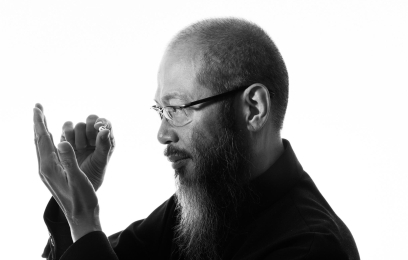
As part of the Political Observatory of Latin America and the Caribbean’s tenth anniversary celebrations and the Quai d'Orsay's Latin America and Caribbean Week, Sciences Po was honoured to receive two large-scale works gifted by Mr. Sebastião Salgado to the library, in the presence of the artist. This is the photographer's first donation to a university. It is also the first time an artwork has been donated to Sciences Po.
The two photographs, taken by Salgado in 1986 and 2016 in the Amazon, illustrate the artist's work for and commitment to both the environment and the fight against poverty. This commitment has been commended by political figures such as Nobel Peace Prize laureate Oscar Arias and by leaders of international organisations, such as Angel Gurria, Secretary-General of the OECD, who spoke at the opening reception.
The 1986 photograph, taken in the Serra Pelada mine (state of Pará), shows 50,000 garimpeiros (gold diggers) deep in the mud. They're digging for gold, a source of both inhuman labour and hope for the workers.
In contrast, the 2016 photograph shows the immensity of the Amazonian forest, a territory threatened by deforestation and man’s exploitation of its natural resources.
With this donation, Salgado underscores his support for the values of humanity, ecological concern and intercultural dialogue championed by Sciences Po. The photographer wishes to draw the public’s attention to educational issues and has always promoted the type of cultural exchange fostered by the University.
The works, both 1.80m by 2.70m in size, are exhibited in Sciences Po's Petit Hall at 27 rue SaintGuillaume in Paris and can be viewed by all Sciences Po students, faculty, staff and visitors.

21.03.2018
SCIENCES PO OPENS ITS FIRST OFFICE IN AFRICA
On 19 February 2018, Sciences Po is inaugurating its first office in Africa, making it the first French university to open an office in an English-speaking part of the continent. This opening marks a new stage in the internationalisation strategy Sciences Po has been pursuing in Africa for more than ten years. It reflects Sciences Po’s desire to make the continent a priority for its development in the years to come.The opening of the Sciences Po office in Kenya is part of a partnership with the Alliance Française in Nairobi. Sciences Po has opted for local representation as the best means to promote the university’s teaching and research across the continent from its base in Nairobi.The office's objectives will be to develop new university partnerships, to encourage student and faculty mobility in both directions, and to strengthen local relations with young people (high school and university students), with the 600 alumni in Africa and with academics, business, institutions and non-profit organisations. Sciences Po’s engagement in Africa is backed by the MasterCard Foundation, which has entered into partnership with Sciences Po to offer support to African students of modest means. The Sciences Po office in Nairobi will strengthen and expand these efforts.Frédéric Mion, president of Sciences Po: “We are delighted to be opening this first office in Africa. We consider this step a sign of confidence in the future of the continent, which is a priority for our international development in the coming years. We in turn wish to inspire confidence in the Sciences Po name in both French-speaking and English-speaking countries in Africa.”Sciences Po already has a presence in Africa thanks to a comprehensive policy—including undergraduate, graduate and executive education, and student exchanges in both directions—which embraces the continent’s linguistic and cultural diversity and has enabled a 59 percent increase in the number of students from Africa in the last five years with 629 African students at Sciences Po in 2018.This policy is implemented through specific actions: An active network of 29 university partners based on reciprocity and spread across the continent and its language areas, from Morocco to South Africa and from Ghana to Senegal to Kenya.Course content focused on Africa: The Europe-Africa undergraduate programme, which more than 200 students take each year, addresses the continent from a social science perspective and examines Africa’s relations with Europe; the Paris School of International Affairs (PSIA) offers an African Studies concentration, with more than 200 students enrolled each year; and an “African Cities” course is offered at the Urban School.Continuing education courses focused on Africa, with an Executive Master in Development Policy and Management – Potential Africa and a Lead Campus Certificate with the University of Cape Town and the Institut Supérieur de Management de Dakar.An online learning course and more to come: the MOOC “Africa and globalisation: a comparative perspective” has just been launched in partnership with the University of Cape Town (South Africa), the University of Khartoum (Sudan) and Université Gaston Berger, Saint-Louis (Senegal).Ambitious needs- and merit-based scholarship programmes for African students (more than 100 students each year), funded by The MasterCard Foundation, MacMillan, L'Oréal, Total, and more.Sciences Po in Africa so far:More than 600 African students at Sciences Po in 201829 partner universities30 Master's programmes with courses on Africa160 students on the Europe-Africa programme in Reims 25 languages taught including SwahiliOver 100 study grants for African students each year funded by Sciences Po, including full scholarshipsAn ambitious programme for 120 scholarships over six years proposed in partnership with The MasterCard FoundationAbout Sciences Po:Built on values of openness and excellence, Sciences Po is a world-class research university, both selective and open onto the world, whose unique model links specialization in humanities and social sciences, multidisciplinary and professional learning in order to educate future leaders capable of understanding and transforming society. Diversity is a core value at Sciences Po where 47% of students are foreign, from 150 countries, and 27% of students hold scholarships, compared to 6% in 2000.Press contacts Sciences Po in Nairobi / Sheila ChepkoechPh. +254(0) 700 009 667 – email: sheila.chepkoech@sciencespo.frSciences Po in Paris / Marie FrocrainPh. +33 1 49 54 37 71 – email: marie.frocrain@sciencespo.fr
Read more
